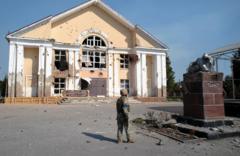Russia and Ukraine exchanged 230 prisoners of war on Saturday, weeks after Ukraine launched a cross-border attack into the Kursk region of Russia.
The Russians released on Saturday were captured in Kursk, Russian state news agencies reported, citing the country’s defence ministry.
The ministry said 115 soldiers were returned “from territories controlled by the Kiev regime,” while Ukrainian President Volodymyr Zelensky said “another 115 of our defenders have returned home today”.
It is the first such swap since Ukraine first began its incursion into Russia on 6 August.
Kyiv has said one of the goals of the Kursk offensive is to capture Russian soldiers to trade for Ukrainian prisoners of war. Ukraine claims to control over 1,000 sqkm of the Kursk region.
The United Arab Emirates reportedly mediated the swap.
Separately, on Saturday Ukraine said it had carried out an attack on a Russian ammunition depot in the southern Russian region of Voronezh. Kyiv also reported that five people had been killed in a Russian strike on the eastern town of Kostyantynivka.
President Zelensky said the returned Ukrainian soldiers were members of the National Guard, the Armed Forces, the Navy, and the Border Guard.
“We remember each and every one. We are searching for and making every effort to bring everyone back,” he said.
“This brings closer the release of our military, our civilians from Russian captivity. Thanks to our team and partners, the UAE for our people returning home,” he said.
Mr Zelensky said that in addition to capturing Russian soldiers, the Kursk operation had other goals he could not disclose.
The Ukrainian president said the operation was a preventative strike to deter Russian attacks towards Sumy, a city in Ukraine.
He added Ukraine would do everything to force Russian President Vladimir Putin to end the war through diplomacy.

